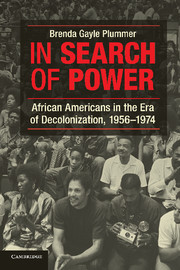Book contents
- Frontmatter
- Contents
- Figures
- Introduction
- 1 A Great Restlessness
- 2 Peace or a Sword?
- 3 “Freedom’s Struggle Crosses Oceans and Mountains”
- 4 Meeting Odinga
- 5 When Race Doesn’t Matter
- 6 Embracing the Globe
- 7 Race, Space, and Displacement
- 8 Africa and Liberation
- 9 Agenda Setting on Two Continents
- Conclusion
- Bibliography
- Index
- References
8 - Africa and Liberation
Published online by Cambridge University Press: 05 December 2012
- Frontmatter
- Contents
- Figures
- Introduction
- 1 A Great Restlessness
- 2 Peace or a Sword?
- 3 “Freedom’s Struggle Crosses Oceans and Mountains”
- 4 Meeting Odinga
- 5 When Race Doesn’t Matter
- 6 Embracing the Globe
- 7 Race, Space, and Displacement
- 8 Africa and Liberation
- 9 Agenda Setting on Two Continents
- Conclusion
- Bibliography
- Index
- References
Summary
In September 1970, Howard Fuller (Owusu Sadauki) arrived in Dar es Salaam as a representative of both the southern-based Student Organization for Black Unity (SOBU) and Malcolm X University, which he had founded in Greensboro, North Carolina. Malcolm X University emphasized science and engineering, fields often weak at conventional black colleges and universities and much in demand in developing countries. SOBU had worked on labor and housing issues in North Carolina, earning local respect. It developed a Pan-African Medical Program that collected and donated equipment and supplies to African liberation organizations. SOBU appointed a liaison officer to connect it with the revolutionary Southwest African People’s Organization (SWAPO) and with African student unions. The group established “fraternal relations” with the Palestine Liberation Organization (PLO) and some Iranian student associations. Fuller met with foreign revolutionists abroad and published an account of his travels in the African World, a SOBU newsletter that included news of student activism in United States and overseas reports provided by correspondents in Canada, Africa, and the Caribbean. In line with the African socialist agenda espoused by Nyerere, SOBU embraced a plan to have black students work as agricultural laborers in the U.S. South in preparation for serving rural African societies. This Pan African Community Work program, in the words of historian Fanon Che Wilkins, would help college students complete the “awesome responsibility of committing class suicide.”
- Type
- Chapter
- Information
- In Search of PowerAfrican Americans in the Era of Decolonization, 1956–1974, pp. 271 - 306Publisher: Cambridge University PressPrint publication year: 2012

